The Immortal Life of Henrietta Lacks is a remarkable story. From a single, abbreviated life grew a seemingly immortal line of cells that made some of the most crucial innovations in modern science possible. Henrietta Lacks was a 31-year-old black mother of five in Baltimore when she died of cervical cancer in 1951. Without her knowledge or consent, doctors treating her at Johns Hopkins took tissue samples from her cervix for research. This sample of her cancerous tissue, turned out to provide one of the holy grails of mid-century biology: human cells that could survive – even thrive – in the lab. They spawned the first viable, indeed miraculously productive, cell line – known as HeLa. These cells have aided in medical discoveries from the polio vaccine to AIDS treatments. The Immortal Life of Henrietta Lacks a fascinating and moving story of medicine and family. Skloot exposes the minefield of scientific, legal, and philosophical questions raised by Lacks’ unwitting legacy. She weaves together the disparate threads of biography, science, and social history, to provide a remarkably evenhanded assessment of the shadier dealings of the biomedical industry despite her obvious affection and sympathy for the Lacks family. Hailed by the New York Times, The Immortal Life of Henrietta Lacks was featured on over 60 critics’ best of the year lists. An important book that will linger like Henrietta’s cells long after you’ve turned the last page.

